3 - Mulumba Joseph wa Nkudimba, “man of peace”
Summary
Although the process was clearly difficult for Adolphine, her commitment to telling her story never wavered and her innate courage sustained her in revisiting painful memories. Yet it was only after she and I had spent many hours in deep conversation that I felt emboldened enough to question her in more detail about her father who had died so tragically in 1996: regarding his roots and what, to her knowledge, had shaped his character. I was particularly cautious because her profound love for him had shone through all our previous interactions. When she told me Nkudimba's full name meant “man of peace”, she added that the name had fitted him like a glove.
Nkudimba had started life as an orphan. He was only four when his parents had been killed in 1950 during the colonial rule of the Congo by the Belgians, in brutal civil unrest which had been ongoing sporadically in the years that preceded the country's independence. He was the youngest of nine children who were all born in Mbuji-Mayi, the capital of the Kasai-Oriental Province in south-central Congo. After being orphaned, he and his siblings were protected by the Catholic Church. His parents had been rich cattle-owners with large vegetable plantations. When people began stealing livestock and various flourishing crops left behind by Nkudimba's parents, the Church took control of the family's considerable assets.
I had to set aside my “Western” ways of thinking when Adolphine explained: “People were jealous and used witchcraft whereby seven of Papa's siblings died mysteriously, one after the other, without becoming sick. My father also became sick but survived by the grace of God. He left the area to stay with his elder sister who lived nearby and he studied at a school run by the Catholic Church. He was very clever academically, but the Church also recognised his artistic talent and saw to it that he learnt artwork. After secondary school they sent him to the University of Kinshasa to study medicine. His sister looked after him, but only until she got married and had to start supporting her father-in-law.
“When his sister died, Nkudimba was in his late teens. From there on he had to find his own way in the world. I suppose, because he grew up without a father figure and because he was idealistic by nature, he wanted to mould his life in a positive way.
- Type
- Chapter
- Information
- Escape from LubumbashiA Refugee's Journey on Foot to Reunite her Family, pp. 12 - 16Publisher: University of South AfricaPrint publication year: 2021



